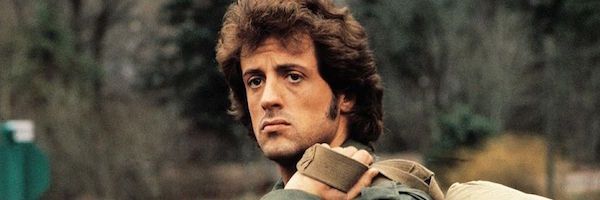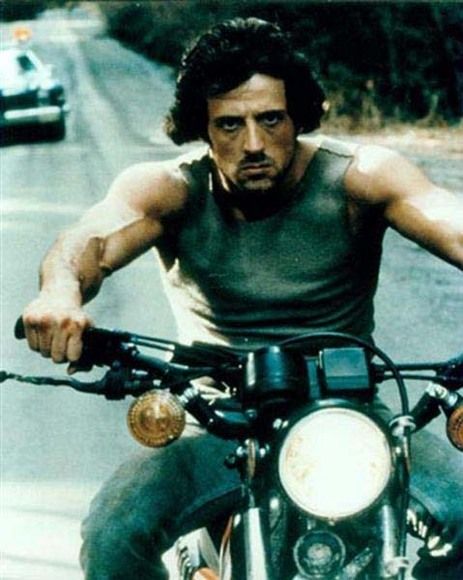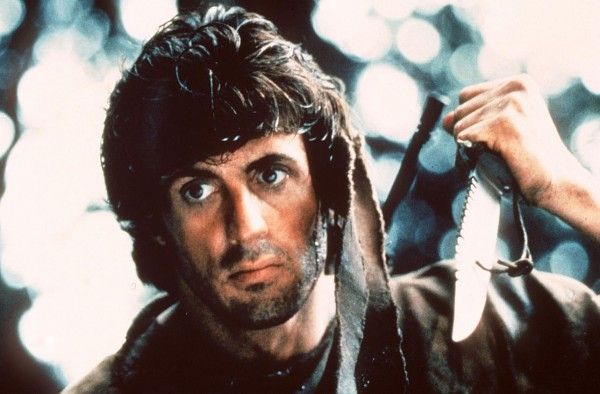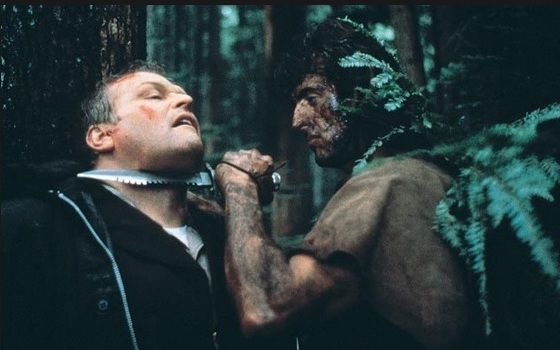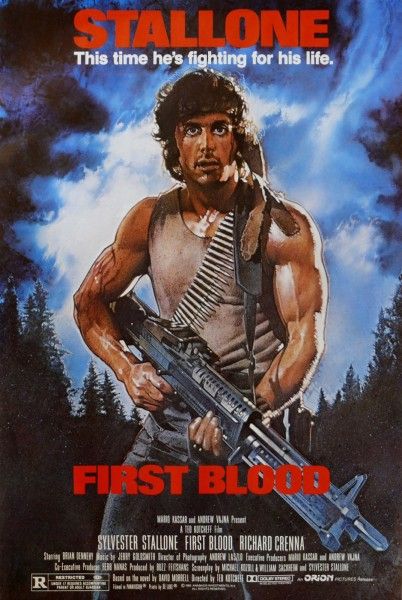[Editor’s Note: Welcome to Stream This, our weekly feature where we single out television programs and movies of considerable merit that are available on Netflix, Hulu, Amazon, Crackle, or other streaming services. Look for a new recommendation from Stream This every week.]
In a way, First Blood, the inaugural volume in the Rambo franchise, was the beginning of a particularly loathsome perspective that Sylvester Stallone has proven adept and willing to proliferate. Both here, under the direction of the undervalued Ted Kotcheff, and in a remarkable amount of Stallone's subsequent roles, the iconic action star positioned himself as a unique victim of society's prejudices, even though his characters turn out to be extraordinary and ultimately more powerful than his innumerable foes. Stallone likes playing the One Good Man Left but also relishes being underestimated, acting as if he's the underdog despite the fact that he's been rich and famous for most of his life. It's a simplistic perspective, to be sure, but even worse, it's patently ridiculous for an extremely white, relatively healthy millionaire to be playing an unappreciated hero.
This isn't nearly as big an issue with Bruce Willis, whose sardonic attitude has often cracked the self-seriousness of such material, or Arnold Schwarzenegger, who rarely plays himself as victimized, but it's proven a sizable issue with most major action films of the last two decades. (At it's best, this tactic taps into the undue scorn such physically endowed performers receive from cinephiles who have little taste for action films, but this thematic idea is rarely developed beyond insinuation.) In the case of First Blood, however, there's a surprising complexity that begins to develop early into the film regarding guns, police, and the idea of violence as a developed skill, rather than a easy problem-solving tool.
When Stallone's John Rambo is detained by the police in Hope, Washington, believed to be an unruly element by Sheriff Will Teasle (Brian Dennehy), he is subjected to a belittling, mildly sadistic process of questioning. Chief Deputy Galt (Jack Starrett) leads the push, and both beats Rambo and sprays him with a high-pressured hose, for seemingly no other reason than his own assurance of total power and gleeful sense of domination. Even later, when Rambo escapes the police station and takes to the surrounding woods, Galt is obsessed with proving his power over Rambo, to the point that the deputy tries to shoot him dead when he gives himself up. It's Rambo's subsequent, indirect killing of Galt in self-defense that touches off a small war in the small Washington town, and brings out a distinctly complicated view of warfare and bloodshed that Stallone has rarely been associated with since.
Kotcheff has made his name as the kind of studied, genre-hopping filmmaker that has proven equally adept at the thoughtful (The Apprenticeship of Duddy Kravitz, Wake in Fright) and the preposterous (Weekend at Bernie's). He has an eye for detail that is evident in both these instances, and that's part of what brings out the enveloping fascination of First Blood. It's in the woods, after Galt falls to his death, that Teasle and his fellow officers, played by David Caruso and Chris Mulkey most prominently, are informed that Rambo is a Vietnam vet. The viewer, however, is let in on this with a series of short, understated flashbacks to Rambo's capture and torture by the Vietcong, which come while Galt and his colleagues are assaulting Rambo. Though it's not developed as well as it could have been, there's an underlying outrage to the film regarding how former soldiers, including those with sever PTSD, were (and still are) left with little support following their heroic tours of duty; when we meet Rambo, he is seemingly homeless, visiting the home of a fellow soldier who died from cancer linked to inhaling Agent Orange.
The final straw is when Rambo's surrender is met with gunfire, but even as the blood begins to flow, Rambo doesn't simply rely on guns to halt the police. In fact, most of his attacks are either done by sheer brute force or handmade traps placed throughout the woods; the man even makes himself a scarecrow to divert Teasle's men. The police, on the other hand, use guns and explosive devices almost exclusively, and there's more than a slight insinuation that these weapons allow untrained, dangerous, and frankly unprofessional men to kill without much skill or thought. At one point, during a shoot-out, a local officer remarks that he's just a volunteer and that he didn't get into the job thinking that he would get killed. Not long after, Teasle's orders to hold-off the all-out attack on Rambo until he arrives in the woods are blatantly ignored, and some reserves attempt to blow Stallone's character up with a bazooka. Rather than brokering peace, these men see murder as the easiest, and therefore most preferred, option.
This isn't a blanket criticism of the police, but rather a careful, insightful view of control and masculinity, and how a gun and a badge can act as fatal enablers for men who favor pride over empathy. In a climactic moment, when Rambo begins waging war in the actual streets of Hope, the character opines that there is no honor in America, whereas, in the service, it's an understood bond between soldiers that honor comes first. The police are everyday heroes, no matter how many of them turn out to be dirty or straight-up psychopaths, whereas soldiers must take on a more international perspective and can easily become the scapegoats for the politicians that begin and extend wars. The inability for Teasle and his men to admit that they did something wrong, to admit fault and take their punishment without exception, is what causes the widespread destruction toward the end of the film, and the timeliness and reverence of such actions has hardly dulled in the decades following First Blood's release.
Kotcheff, working from a script by Stallone, William Sackheim, and Michael Kozoll, harps on these ideas consistently, but only up to a certain point, which is due largely to the lack of complexity in Rambo as a character. As symbols go, however, First Blood ends up being a strangely bold criticism of the Vietnam War, with Rambo himself acting as a metaphor for the Vietcong. The cops go after him in the woods, despite them not having the same familiarity of the terrain and survival skills as Rambo does, and end up with a body count and several wounded officers, to say nothing of the property damage. Despite this reflective political perspective, however, First Blood is first and foremost an excellent acton films, fleetly paced with smart, tight editing and strewn with impactful set-pieces. In other words, First Blood shares more than a passing resemblance to the great B-movies of the 40s, 50s, and 60s, delivering cheap thrills while mulling over societal and philosophical ideas that more polished, "prestigous" films don't quite have the stomach for.
First Blood is currently available to stream on Netflix.

